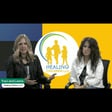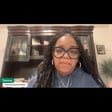Become a Creator today!Start creating today - Share your story with the world!
Start for free
00:00:00
00:00:01

S3/Ep 1: When the Nest Empties: Finding Yourself After Your Kids Leave Home
The kids are gone - now what? Join us as empty nest expert Anthony Damaschino, author of The Empty Nest Blueprint, reveals how to navigate one of parenting's biggest transitions.
Whether you're married or single, discover how to overcome codependency, rediscover your identity beyond "mom" or "dad," and transform this ending into an exciting new beginning. Learn the difference between staying connected and holding on too tight, plus practical strategies to thrive in your newfound freedom.
Transcript
Season 3 Introduction
00:00:00
Speaker
Welcome to season three of the Guardians of Hope podcast. We are a community of parents, educators, health, legal, and tech experts dedicated to positively impacting children's lives. The thoughts and opinions of my guests are not my own. This is a platform for sharing. All right, welcome everyone.
Emotional Impact of Children Leaving Home
00:00:19
Speaker
Whether you are married or single, watching your children leave home can trigger unexpected emotions and life changes that many parents aren't prepared for.
Meet Anthony D'Amaschino: Empty Nest Expert
00:00:29
Speaker
Today, we are joined by Anthony D'Amaschino, author and expert on Empty Nest Transitions,
00:00:35
Speaker
who has written extensively about helping both married couples and single parents navigate the significant life shift. Anthony understands that the Empty Nest experience looks different for every family structure, and he's here to share practical strategies for not just surviving the transition, but thriving in this newfound chapter of life.
Career Transition: HR to Author
00:00:58
Speaker
Welcome, Anthony. Thank you, Cynthia. I'm super happy to be here, so thank you. Thank you for having me. Me too So why don't you start off by telling us a little bit about your professional experience?
00:01:10
Speaker
Sure. ah my ah Most of my career was in human resources. i ah worked basically doing all the things that an HR person does. And I did that for about 25 years. So everything from a recruiting, hiring, firing, training, advising.
00:01:29
Speaker
And it grounded me on people in many ways. And ah the thing I liked about it, because there's there's HR people that are kind of police, and then there are HR people that are friends of the employee. So it's it's good to try and find that balance. But most of my career was in HR.
Inspiration Behind Writing on Empty Nesting
00:01:49
Speaker
ah About two weeks before COVID, I decided to step away from human resources and, ah and then jump into something new. And I wasn't sure what that new was gonna be.
00:02:01
Speaker
ah My children came home or two came home from college during COVID. and then ah And then i had in my head the book or books on empty nesting kind of, let's say sauteing for several years. And I finally just got around to writing after they all went back to school and and COVID kind of,
00:02:25
Speaker
you know, stopped shutting things down, so to
Emotional Preparedness for Empty Nesting
00:02:28
Speaker
speak. But HR by trade, i consider myself a recovering HR executive. And now I guess I'm a writer by trade. So yeah, well, do you pull from life experiences or research? I know um I'm just following up on your experience because it's so interesting how you pivoted from HR to writing these books.
00:02:49
Speaker
Yeah, you know, I always wanted to to, you know, I feel like there's a book in everyone. So I really feel everyone has a story, whether it's fiction or nonfiction or something they want to pass on and tell.
00:02:59
Speaker
So I did always think that I would write a book someday. um And I think when I went through the empty nest transition, I have three children.
00:03:11
Speaker
ah And my first left, my son eldest son left the house and I still had a freshman and a sophomore or freshman and a junior in high school. So i had two high schoolers, my son left.
00:03:27
Speaker
And I saw some things going on in the world around me ah with other couples and with people going through that emptiness transition that kind of made me start formulating, wow, this is ah this is a strange time in people's lives.
00:03:42
Speaker
yeah And it hits a lot of people by surprise. And so I went through that. And then as I was going through that, I just kept thinking, gosh, I wish there was something out there to help me through this transition. And I didn't see anything. So, ah you know, I guess that's the story of many books. You know, there was ah I thought there was a need. And so I decided to. ah To write it. And and yeah, I mean, i'm I'm no perfect person. I made mistakes. I learned a ton.
00:04:11
Speaker
I did a lot of research for, you know, two plus years just trying to dig into the facts. But ah yeah, I think the emptiness transition is an underrated transition. I say that ah because I don't think people are prepared for it.
Identity and Relationship Shifts Post-Empty Nest
00:04:26
Speaker
Absolutely. You're so right about that. And I want to dig right in with um the feelings that parents have. I feel like from what I'm hearing, a lot of parents are blindsided by these emotions, even though it's something that they've been looking for or looking forward to. um during parenthood.
00:04:47
Speaker
um What are some of the most common feelings that you've come across from other parents and why do these emotions often catch parents off guard? Yeah, ah you know, and and ah i guess I guess the first thing is if if you think about big life events, right, you you prepare ah for college if you go off to college, you prepare to get married. Most people don't get married in 24 hours, right? There's planning and and dating and all that. When you have a child,
00:05:18
Speaker
Luckily, you have at least nine months to prepare in most cases ah to have that child. And a lot of us from you know in our 20s and 30s are starting to prepare for retirement, whether that's a four one k or whatever.
00:05:31
Speaker
But what people don't prepare for is their empty nest transition. And it is that gap from 44 to about 60 years old when sixty years old um when You're there whether you're a single parent or whether you're in a couple, those children leave and your entire life changes.
Unique Challenges: Married vs Single Parents
00:05:50
Speaker
And to get to your question, you know the the initial thing that some people some people, it's great, right? Their kids leave, they're happy, everything's smooth.
00:06:01
Speaker
But for a lot of people, ah the first feelings most people feel is sadness and loss, right? They feel like they have they've been an active parent for two decades.
00:06:12
Speaker
And everything that comes with active parenting, yes, the the chasing them for homework and picking up their socks, but also the love, the hug, the feeling wanted, feeling needed.
00:06:26
Speaker
It's your own personal identity. I'm i'm the coach. I'm the room mom. I'm the father. ah So when this changes, when these children, our children go off to school, there are a lot of emotions.
00:06:40
Speaker
And sadness and loss may be the beginning, but then I think people start looking inward. And now that I'm no longer an active parent, What is my new identity?
00:06:51
Speaker
And in some cases, now that I'm no longer an active parent, how are the rest of my relationships in my life with my spouse, with my family, with my friends?
Marital Strain: Increased Divorce Rates
00:07:01
Speaker
Because let's face it, as parents, we are all in, especially in today's society, you know our our lives revolve around our kids, whether it's shuttling them around or looking after them or writing them to get their homework done.
00:07:15
Speaker
Yeah, exactly. You touched a little bit about the household dynamic a little bit, Anthony. Let's talk about that. In your books, you address both married parents and single parents facing the empty nest.
00:07:30
Speaker
So how do these experiences differ? i mean, aside from the, you know, what we can expect from But um what unique challenges does each group face ah during this time?
00:07:42
Speaker
yeah what what I saw with, let's ah we'll address the married couples first. What what I saw with that is um there is some good in that a married couple has someone else to go through this transition with.
00:07:57
Speaker
ah But we talked about ah divorce rates in the past ah ah before this ah recording. And in the U.S. 20 years ago, one in 10 divorces were people over 50 years old.
00:08:14
Speaker
And today, in 2025, it's a little over one in three are 50 years old. so So a question would be, why are people more prone to getting divorced in their 50s in 2025 than they were 15, 20 years ago?
00:08:32
Speaker
And I think some of those issues are couples have children. They dedicate their entire lives to those children. And And the irony is the one person you can deprioritize when you ah are taking care of children and when you're married is your spouse.
00:08:53
Speaker
I have to show up to work. I have to pay bills. I have to feed my children. The one person
Single Parents: Shock of Empty Nesting
00:08:59
Speaker
I can forget and the one person who's supposed to forgive me is that spouse.
00:09:04
Speaker
And I think what happens for a lot of couples and the reason why the divorce rate is getting so high for people 50 years and older is because they look back on the 20 years and the person they deprioritize is the person that they married.
00:09:21
Speaker
And so that can cause stress in a relationship. I think when the children leave, you look at that partner and say, we have another 30 years together. ah do I want to spend the next 30 years of my life?
00:09:34
Speaker
You like to golf, you like to work out, you like to travel. I don't like to do those things. you know Our whole lives were revolved around our children. Now that our children are gone, are we still a good match?
00:09:46
Speaker
So I think for married couples, there is a relationship kind of check that they need to do along with the identity and control and sadness and those issues.
00:09:57
Speaker
But I think for a married couple, that's the hot spot. What are you and I going to do now that we're no longer parenting full time? hey I think for us a single parent, in many ways, it's tougher.
00:10:11
Speaker
ah There's a t-shirt, you know, being a single parent is my superpower. I love that t-shirt ah because i I am not a single parent, but I did a lot of research and, you know, i had a survey of single parents. I've got over 150 single parents answered my survey.
00:10:29
Speaker
and And it's tough because they are, their whole world, they don't have that other person in their life, so to speak. So their whole world is being a parent.
00:10:39
Speaker
And being a single parent means you are, you are taking care of all of the duties that may be split for a couple. you know You are solely in charge of of feeding and caring and looking after and shuttling and all of those things.
00:10:52
Speaker
So it's much more of a shock or not much more, but it you could see how it would be more of a shock to lose that partner, to lose that person you live with, to lose that other person in the household.
Codependency and Boundaries with Adult Children
00:11:06
Speaker
And then you're then you're alone and you're by yourself. and And just like a married couple or a person in a relationship, you start thinking about, well, what is what what do I need to prioritize with my own life as a single parent? What's important to me?
00:11:25
Speaker
What things have I given up in order to be a single parent that I'd like to re-engage in now that I'll have more time, maybe more ah income, maybe more ability to pursue the things I want to pursue. So it is it is a different struggle, but it's a struggle.
00:11:44
Speaker
Yeah. Now, Anthony, one thing that I've seen come up a lot um or intensified during the emptiness transition is codependency, whether it is with a married couple, parent household or a single parent household.
00:12:02
Speaker
um When parents become overly enmeshed with their children's lives and emotions, how can parents recognize, you know, if they've developed codependent patterns with their kids and what steps can they take to establish healthier boundaries?
00:12:19
Speaker
Yeah, that's a great question. ah In my personal case, if I looked back, I was what you would call a helicopter parent. Right. And and And, you know, we if anyone has a teenager, you know that you know a 15-year-old, 16-year-old is probably not thinking about long-term college or long-term education.
00:12:44
Speaker
what they're gonna do with the rest of their life. They're more interested in the person they're interested at school or playing video games or sports or whatever they're into. And so for me, I was on top of my children's grades.
00:12:59
Speaker
Obviously I controlled their finances and their lives and their and the rules and expectations. And I think, ah You know, to to some degree, that's great parenting and I'll pat myself on the back. In another way, it's helicopter parenting and it's it's it's putting a lot of pressure on on my children and and it is controlling aspects of their lives where I shouldn't necessarily be in full control. I had that realization with my son when he went off to school and I changed, and I have obviously this stuff in the book, but but I changed kind of my philosophy on some things for both of my daughters.
00:13:41
Speaker
Not perfect in any way, shape or form, but I realized I needed to land that helicopter and let them fly solo. And I think ah that codependency is even tougher today.
00:13:55
Speaker
You see it with... ah you know I'll go to a friend's house for dinner and they're they they can have a child call three times while I'm there. And that child will be 22 years old, 18 years old, whatever.
00:14:07
Speaker
and And so, you know is that great? Do they have a great relationship with their child? Yes. ah Is that a little much? Some people would say yes. ah We want our children to become adults. We want our children to make decisions and and live their lives. And so I set some things up before my kids went away to school to make sure that happens.
00:14:34
Speaker
But i think it's I think in an era of hypercommunication, codependency is... You know, you find my friends, you know, you used to leave your home when you were a child and you came back at five.
00:14:47
Speaker
Yeah. Now I know exactly where my children are. Even today, I have them ah find my friends, all three of them on my phone. I know who's at work, if they're at home, where they are. I don't know if they're safe or not when they're away at college, but I do know where they are.
00:15:01
Speaker
And that's a I think that's a, that's a form of kind of codependency in some ways. Yeah, you said it with the communication, the constant communication, um being out, having an adult ah time and then having your teenage or even young adult children call and ask, can you bring me something home? You know, like.
00:15:23
Speaker
I think at some point there there has to be some sort of healthy boundary so that everyone in the household can respect each other and give each other the space that they need, um but also still have like, you know, that close knit relationship.
Strategies for Healthy Parent-Adult Child Relationships
00:15:37
Speaker
So it is a balance for sure. it is Yeah. And I'm going to ask you for some tips. You know, what are some healthy ways parents can maintain that relationship um with their adult children or young adult children without becoming, like you said, landing that helicopter, becoming so overly involved in their lives um so that you can find that balance and still have that relationship?
00:16:04
Speaker
Yeah, I mean, so it's very situational, right? I mean, if if you're if you're the parent of a ah a seven, eight, nine, 10, 11, 12 year, I mean, come on, you have to control aspects of their life. And it's not a dangerous world out there, but there are values, beliefs, expectations that you need to set, right?
00:16:25
Speaker
it's when your child is turning 17, 18, 19, 20, 21, where I think, and not that that's the danger zone, but those are the zones when they are becoming more independent and you want to foster that.
00:16:41
Speaker
And you want to ensure that you have a good relationship with them moving forward. So for me, switching from a controlling parent of teens to, I want to have a great relationship with my young adult children. I want them to want to come back for Thanksgiving. I want them to want to come back into my house and introduce their significant other, or want to come over and play games. I want to be an active part of their life.
00:17:09
Speaker
And so some of that is letting go of the control. Some of that is ah establishing boundaries, letting them make mistakes, letting them make their own decisions, even if some of those decisions may not be the best decisions.
00:17:27
Speaker
I think for people, For children, and when they go off to college, it is the first time in their lives when they are independent of you. They're out of your house.
00:17:38
Speaker
And so that means they have some choices. They can choose to not pick up a phone and not talk to you. They can't do that when they live with you. They could choose to walk away. they can They can have their own beliefs.
00:17:52
Speaker
They can date the people they want to date. They can do all of those things that you may or may not agree with. And so the number one rule people say ah when your child is going off to college or or coming away from you is resolve conflicts.
00:18:09
Speaker
Try and resolve conflicts. any conflicts you have with them before they leave that house. Because once they leave, those conflicts could could build while they're gone.
00:18:21
Speaker
Yeah. Great advice. um Before I move on to the next question, anything else? um I feel like i there are some other things that. um Yeah.
00:18:33
Speaker
Yeah. Sure. the The number one thing for for me was keep the lines of communication in open. and And that's not necessarily texting them every day. But for me, i ah you know I'd send them a St. Patrick's Day card, I'd send them an Easter card. i'd set I mean, i any excuse for me to reach out to my children and not bother them while they're out of the house, but just connect with them, right?
00:19:00
Speaker
um And let them know that I'm there and I'm thinking about them and I care about them. When my children went off to college, I stopped caring about grades. So, ah I mean, in high school, man, if there was a missing assignment, I was on top of my children, right? But in college, let the grades go.
00:19:19
Speaker
What do I care if they get Ds or As in college? its They got to college, it's it's their job now as young adults, right? Who are now in college. Finances, I did something called a money drop, which is a little crazy, but I just gave them six months worth of money twice a year so that ah so that I'm not dealing with, you know, I need money for gas or I ran out of food.
00:19:46
Speaker
Yeah. Put together a budget. I gave them the money associated with said budget and they were on their own. And some months they ran out of money and they had to scrap and save and find some other ways to make ends meet.
00:20:00
Speaker
I am not an ATM machine, right? So, but communication out of all those things is number one. Staying connected to them, supporting them, ah be, you know, listening, but you know, if they, if they, if,
00:20:17
Speaker
There's expectations and there's rules. There are some rules we have when children live in your house. There are some expectations we have when children live in your house. When they leave your house, the rules kind of go away.
00:20:30
Speaker
and And now it just is on expectations. So if you have a conversation with them before they leave, Cynthia, about these are my expectations, that you go to class, that you try hard in school, that you...
00:20:43
Speaker
You know, ah you're going to do the things you're going to do, but, you know, drugs and alcohol and things like that. I don't want that to distract you so much. Right. I'm not I'm not putting down rules. I'm setting expectations. And I think if if if you take that approach, it's more of a partnering approach versus let me lay down some rules before you go off to college, Cynthia. Right. And that's that's just.
00:21:06
Speaker
but You're just changing the letters around in the word parent to partner. Yeah. I love that. Right. Absolutely. And it's again, we're yeah we're going for the long, I mean, I want, again, i'm good. I want grandchildren, right? I want my children to like, and want to be with me.
00:21:26
Speaker
in the future. not you know They don't have to love me at 16 years old, but i I'm thinking more of the long-term relationship. And how can I foster that long-term relationship? Love, support, communication.
Rediscovering Identity Beyond Parenting
00:21:38
Speaker
Yeah, these are great tips, Anthony. Thank you. I have one more question, and this is for my mom friends and you know some parents some father friends, but mostly moms are the ones who take a step back in their careers and do most of the household um responsibilities. So yeah but for any parent who have defined themselves as a primary parent role in their household for 18 plus years, how can they rediscover themselves during this time and find their out like their interests outside of being mom and or dad?
00:22:17
Speaker
Yeah, it's it's ah in in both books, I kind of walk through What did you like to do before? Let's face it, children change your life, right? Again, prior to having children, you weren't going to the soccer field. You weren't running to Trader Joe's five times a day. You weren't going to Target or whatever those things are you do with children, right?
00:22:39
Speaker
so What were your interests and what did you like to do prior to children? Did you like to paint? Did you like to work out? Did you like to play board games with friends? did What were those things that you loved prior to children?
00:22:54
Speaker
And then what were some of, so you make that list. What are some of the things you love doing with your children and that that you want to continue? So let's say you play Frisbee golf with your children or you play again, board games or something like that with your children.
00:23:10
Speaker
Uh, Can you do that with someone else? Right. This is something you still love to do with your children. And then what are all the things that you said you would like to do if you had more time, you had more freedom, maybe even a little bit more disposable income over time ah that you've been putting off? And, you know, most people say, well, I'd work out more and I'd lose 10 pounds or. you know Maybe I'd write a book or those type of things.
00:23:35
Speaker
I think going back and looking at what you're passionate about pre-kids, passionate about with kids, and the things you've always wanted to do, whether that's that's bucket list things, it doesn't have to be traveling around the world. It could be just be taking a nightly walk.
00:23:50
Speaker
here Those are the things that you can... kind of script out for yourself and and create a ah new list of things that you want to do and want to achieve now that you're no longer actively parenting, you know, eight plus hours a day.
00:24:06
Speaker
And I think if everyone just thinks about that a little bit, you'll find that that list is huge.
Resources by Anthony D'Amaschino
00:24:12
Speaker
I mean, it just is. like There are so many things ah that you can do and may want to do now that you have the time to focus on yourself.
00:24:22
Speaker
Yeah. Anthony, it was lovely to meet you. I'm so glad you were able to take some time and walk us through ah this transition in life. Tell us where we can find your books.
00:24:34
Speaker
Yeah, the book's available ah pretty much everywhere. You can go to anthonydamaschino.com or Google Anthony Damaschino or some spelling close to it, and you should be able to find it.
00:24:48
Speaker
Obviously, I'm on social media, and I have 50-plus books ah tips out there on YouTube. But anthonydiamachino.com is probably the best place to go if just want more information.
00:24:59
Speaker
And again, you can get either book for single parents or ah the Empty Nest Blueprint, which is more couple-focused everywhere they sell books. Thank you again, Anthony. Yeah, thank you, Cynthia. I really appreciate it.



















